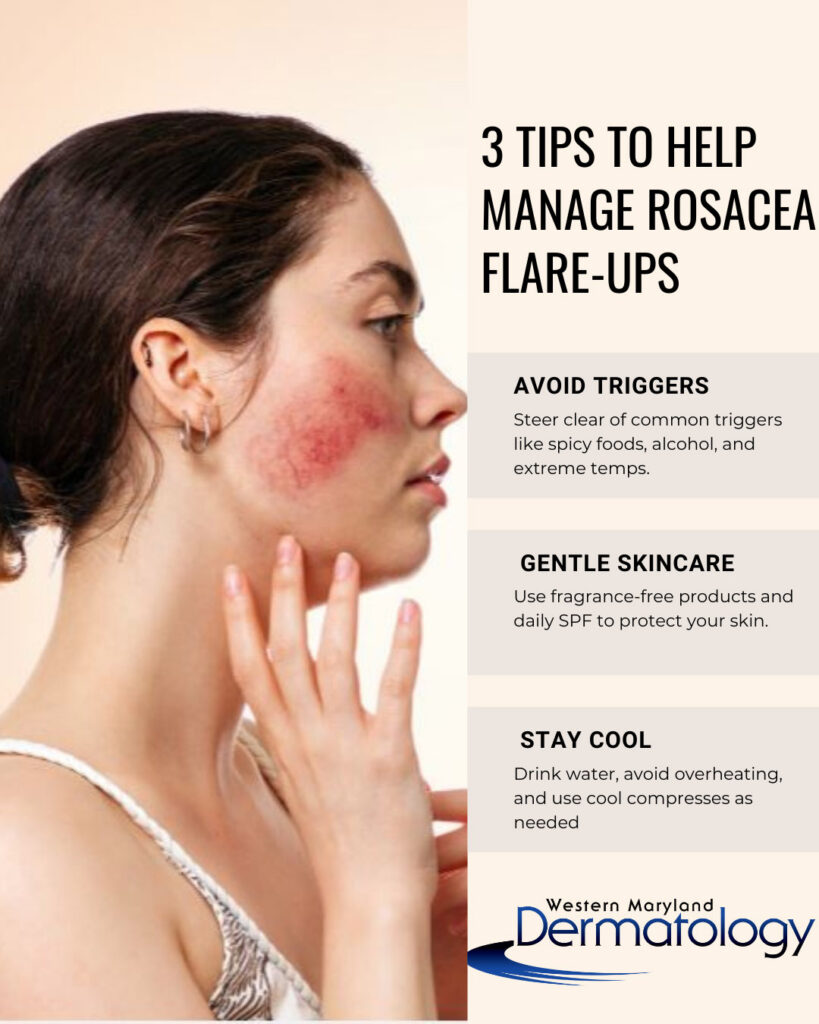Rosascea Awareness Month

April is Rosacea Awareness Month, a time to highlight a skin condition that affects millions of people worldwide—often without them realizing it. Rosacea is a chronic condition that primarily affects the face, causing redness, visible blood vessels, and sometimes acne-like breakouts. While it is often misunderstood or mistaken for simple redness, rosacea can significantly impact a person’s quality of life. This month, we’re raising awareness and helping people better understand rosacea, its symptoms, triggers, and treatment options.
What is Rosacea?
Rosacea is a common, chronic skin condition that leads to redness and visible blood vessels on the face. It often begins with frequent flushing or blushing, but over time, the redness can become more persistent, leading to swollen, irritated skin. It may also result in acne-like pimples, thickened skin, and eye irritation.
Though it typically affects adults between the ages of 30 and 60, rosacea can occur at any age. It’s more common in fair-skinned individuals, but it can affect people of all skin types. Unfortunately, rosacea often goes undiagnosed or misdiagnosed, which is why awareness is so important.
Symptoms of Rosacea
The symptoms of rosacea can vary from person to person, and they tend to come and go in flare-ups. Common symptoms include:
- Facial Redness: The most noticeable sign is persistent redness, typically around the nose, cheeks, and forehead.
- Visible Blood Vessels: Small blood vessels (telangiectasia) may appear on the skin, creating a “spider web” pattern.
- Bumps and Pimples: Acne-like breakouts can develop on the face, but unlike acne, rosacea does not involve blackheads.
- Thickened Skin: In more severe cases, the skin may thicken, particularly around the nose (a condition known as rhinophyma).
- Eye Irritation: Rosacea can cause dryness, burning, or irritation in the eyes, known as ocular rosacea.
What Causes Rosacea?
The exact cause of rosacea is still unclear, but several factors are believed to contribute to its development:
- Genetics: A family history of rosacea increases the likelihood of developing the condition.
- Environmental Triggers: Sun exposure, hot or cold weather, wind, humidity, and air pollution can all exacerbate rosacea symptoms.
- Lifestyle Triggers: Spicy foods, alcohol, hot beverages, and stress are common triggers for many people with rosacea.
- Vascular Factors: The condition may be linked to abnormalities in the blood vessels of the face, which can lead to persistent redness and inflammation.
Treatment Options for Rosacea
While there is no cure for rosacea, there are several ways to manage the condition and reduce flare-ups. Treatment options include:
- Topical Medications: Doctors often prescribe creams, gels, or lotions to reduce inflammation and redness.
- Oral Medications: In more severe cases, oral antibiotics or other medications may be prescribed to control symptoms.
- Laser Therapy: Certain types of lasers can be used to target visible blood vessels and reduce redness in the skin.
- Skincare Routine: A gentle, non-irritating skincare routine is essential. Use products designed for sensitive skin and always apply sunscreen.
- Avoiding Triggers: Identifying and avoiding personal triggers, such as hot drinks or spicy foods, can significantly reduce flare-ups.
Living with Rosacea
Living with rosacea can be challenging, especially when it affects your appearance. The visible symptoms can impact self-esteem and confidence, but it’s important to remember that you’re not alone. Many people with rosacea find that they can manage their symptoms effectively with the right treatment and lifestyle changes.
It’s also important to talk to a dermatologist if you suspect you have rosacea. Early diagnosis and treatment can help prevent symptoms from worsening, and your dermatologist can tailor a treatment plan specific to your needs.
How You Can Help Raise Awareness
During Rosacea Awareness Month, there are many ways you can support the cause:
- Spread the Word: Share information about rosacea on social media to help others recognize the symptoms and seek treatment.
- Support Research: Organizations focused on rosacea research work toward better treatments and a greater understanding of the condition. Consider donating or getting involved in awareness campaigns.
- Get Educated: The more we know about rosacea, the better we can support those who live with it. If you have rosacea, or know someone who does, make sure you’re informed about the condition and its management.
Rosacea Awareness Month in April is a great time to increase awareness of this common yet often misunderstood skin condition. By sharing information, supporting those affected, and encouraging others to seek proper treatment, we can help make a real difference in the lives of those living with rosacea.

